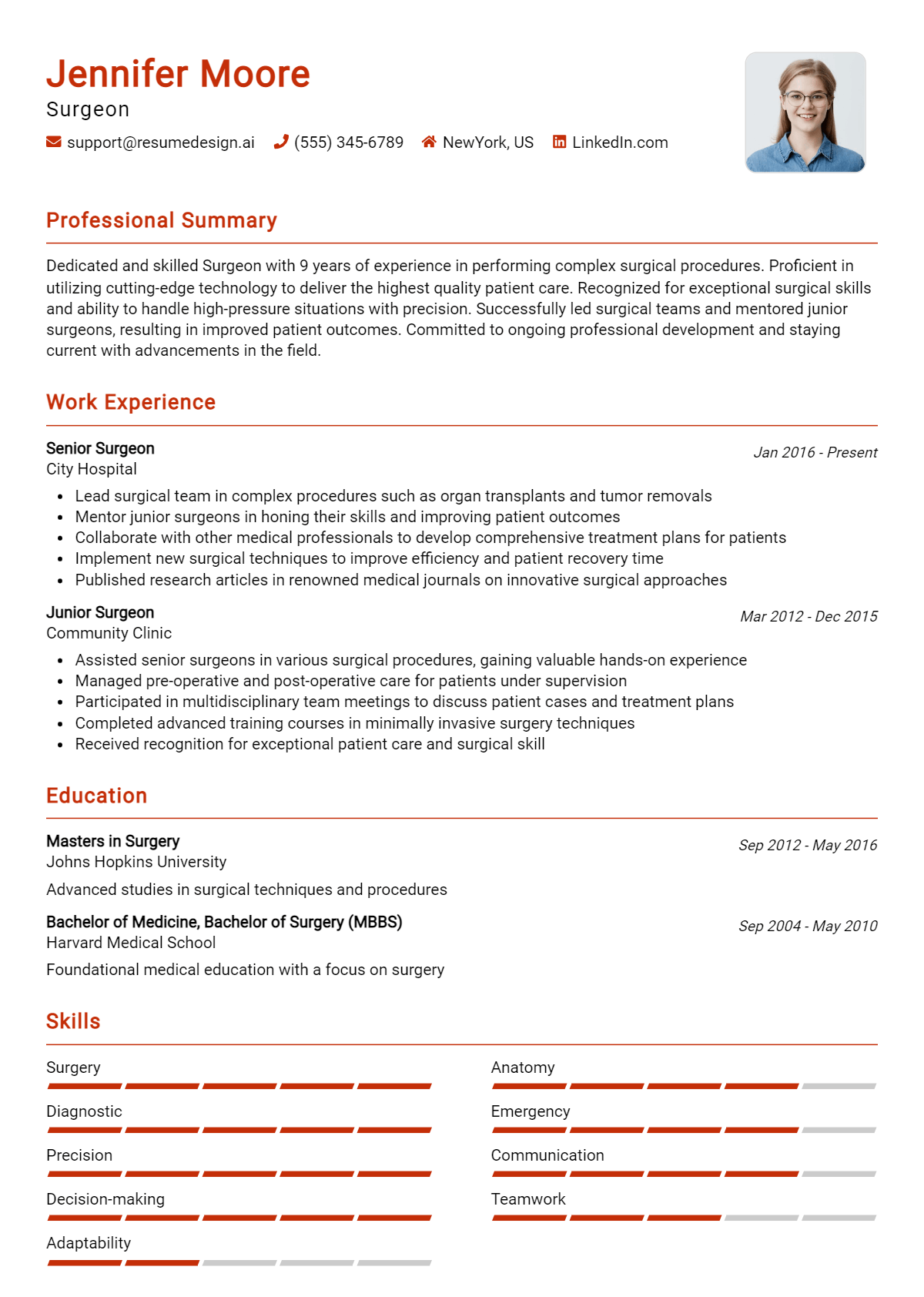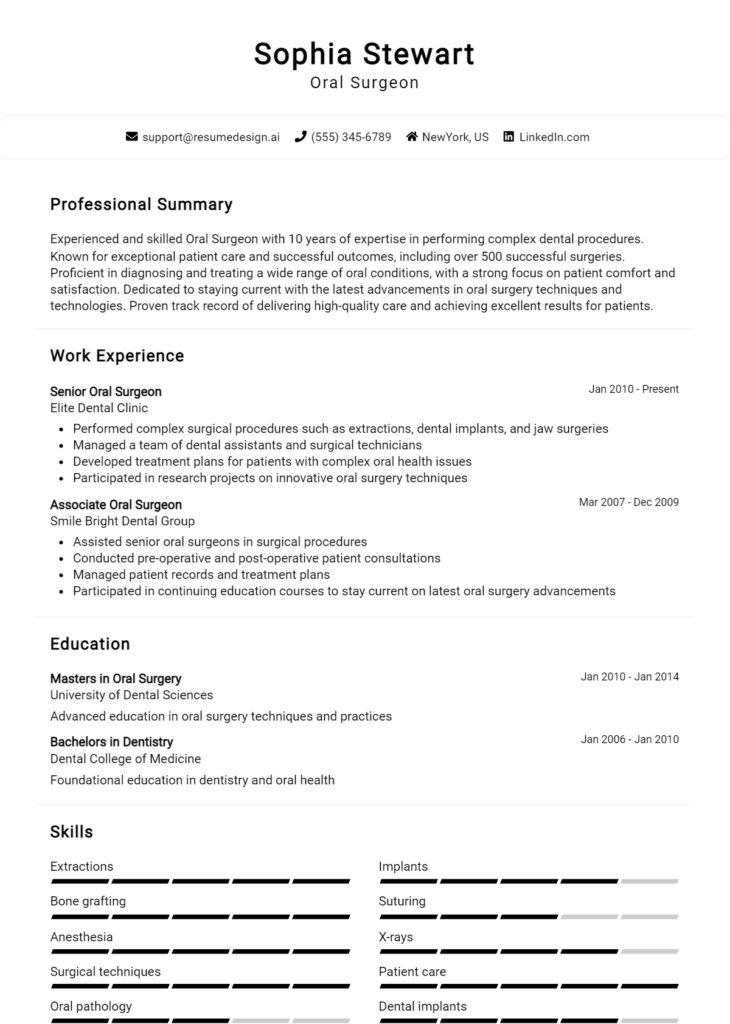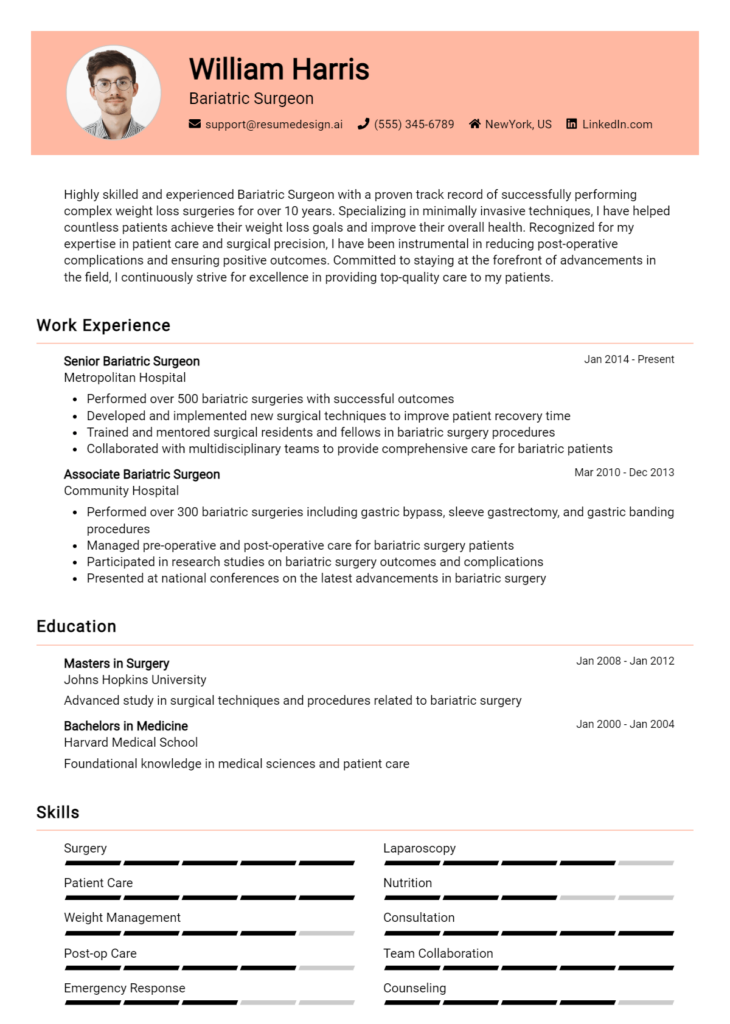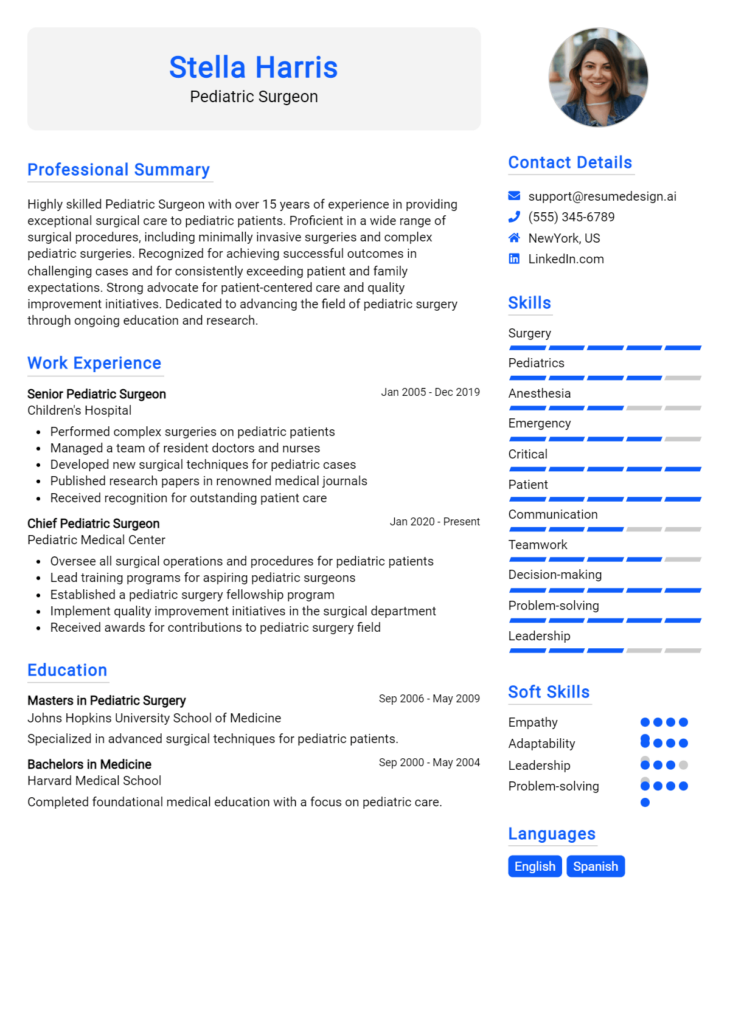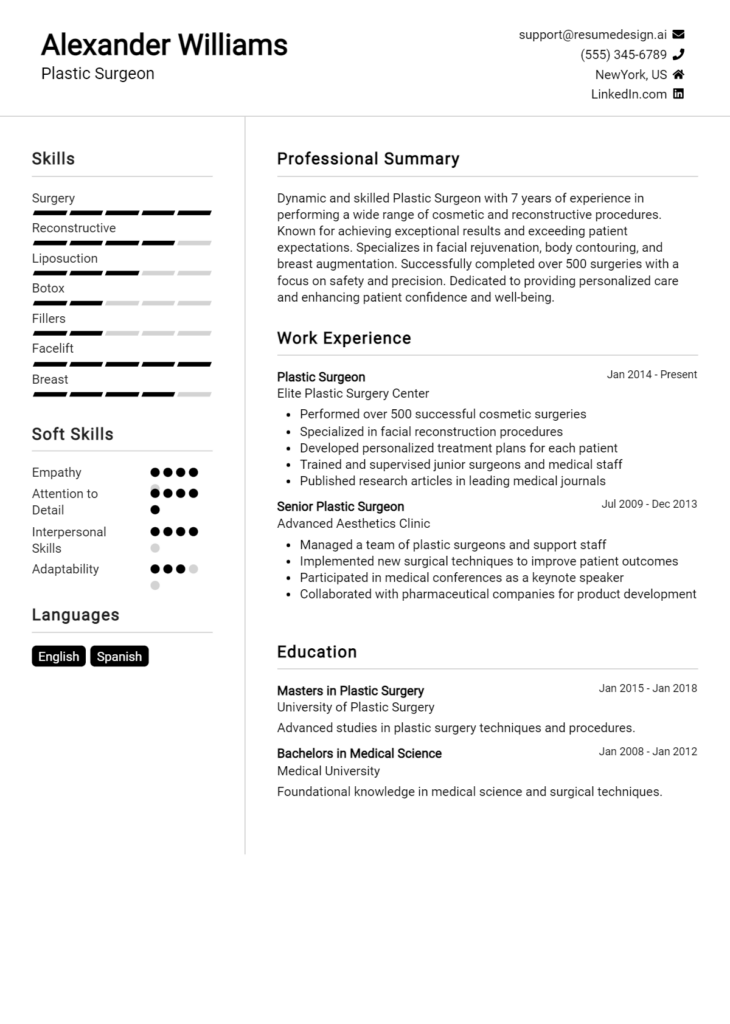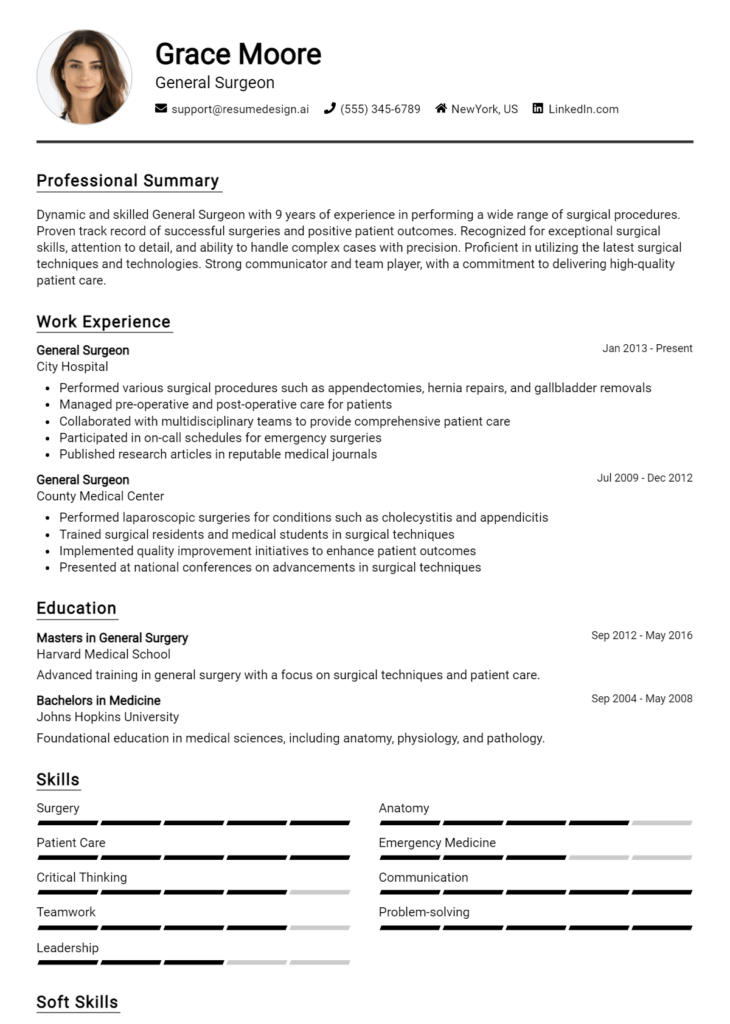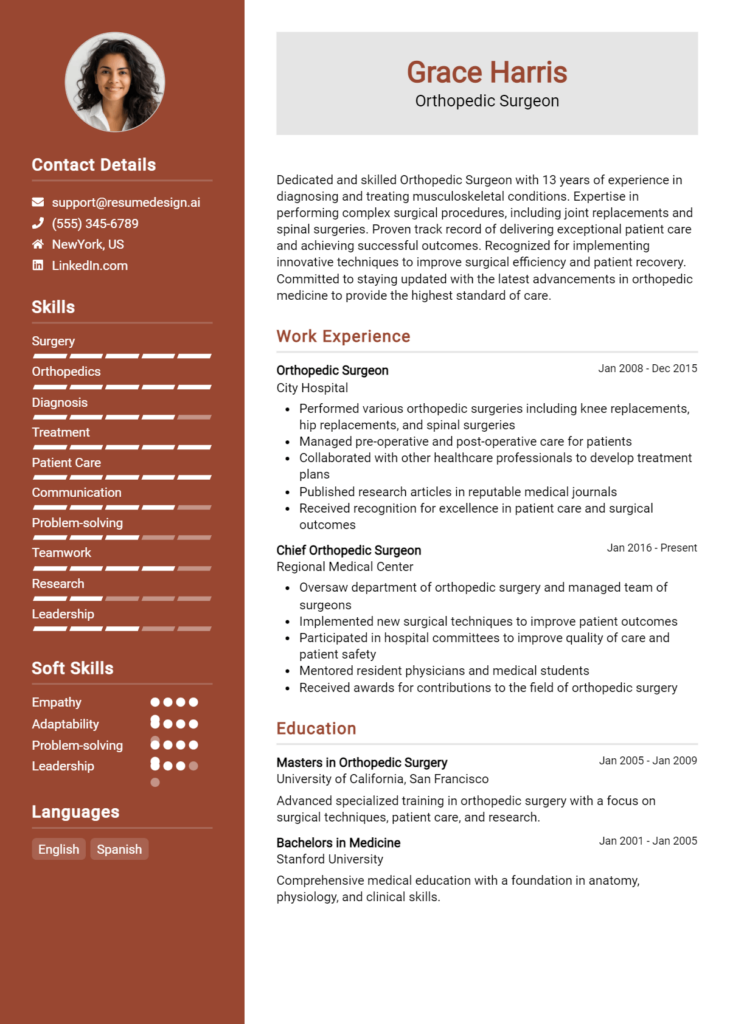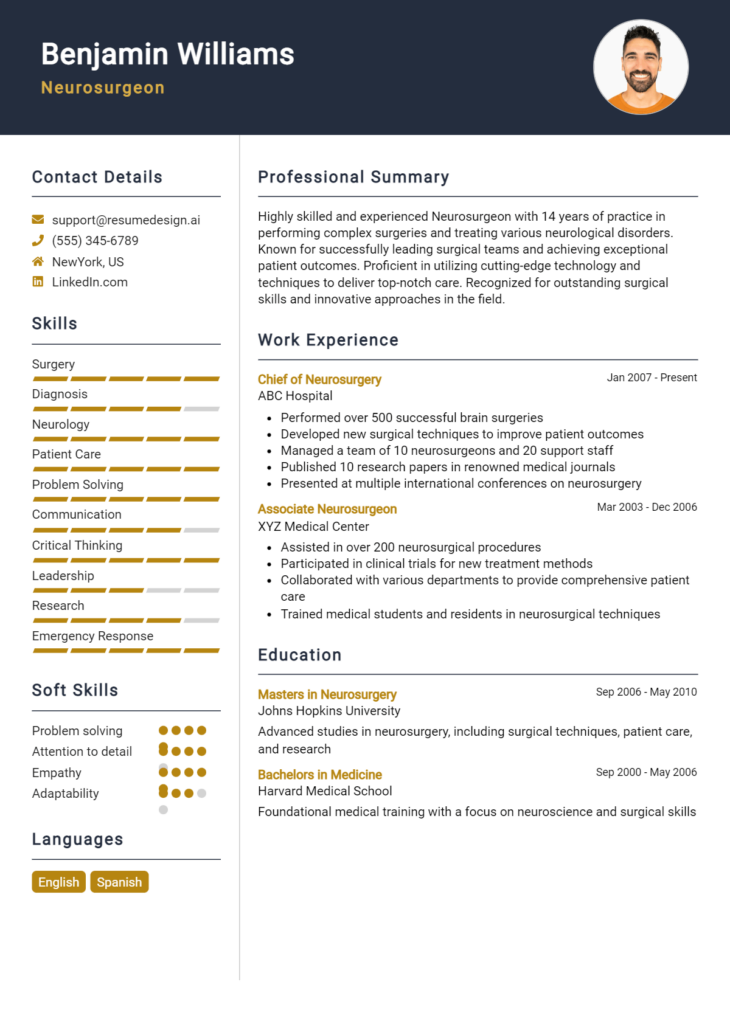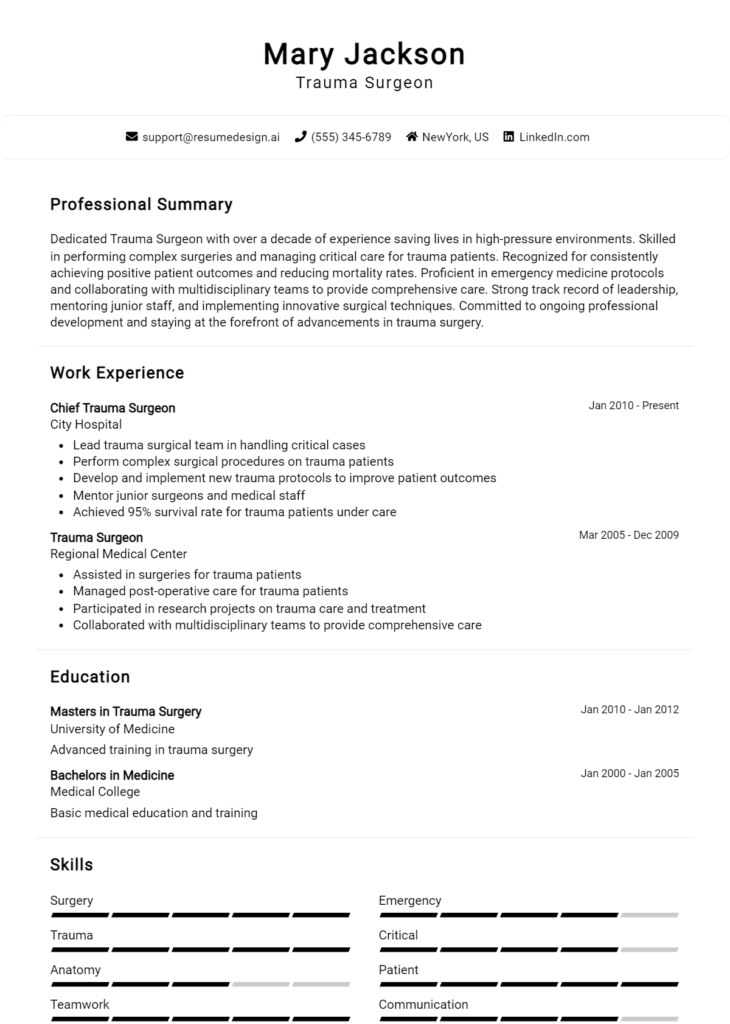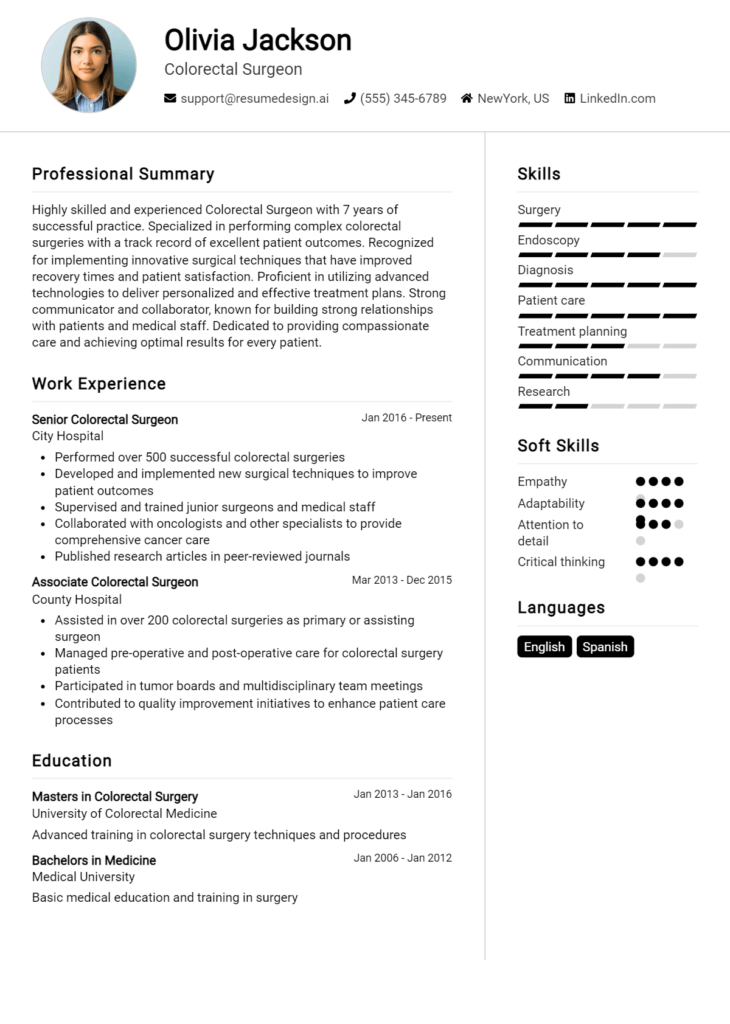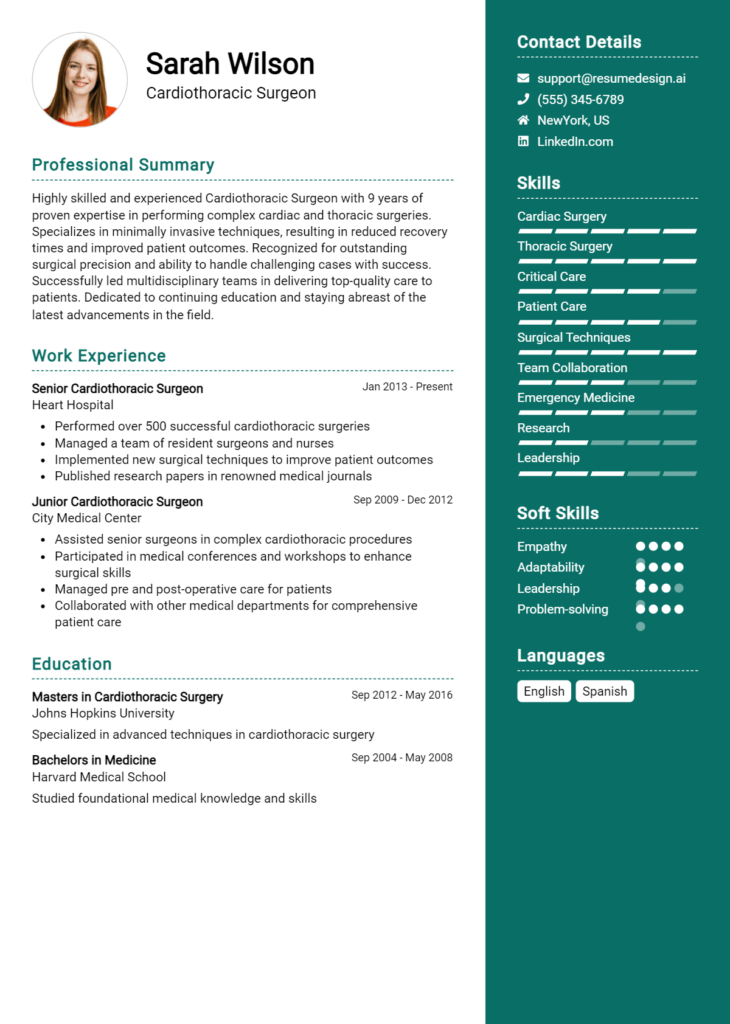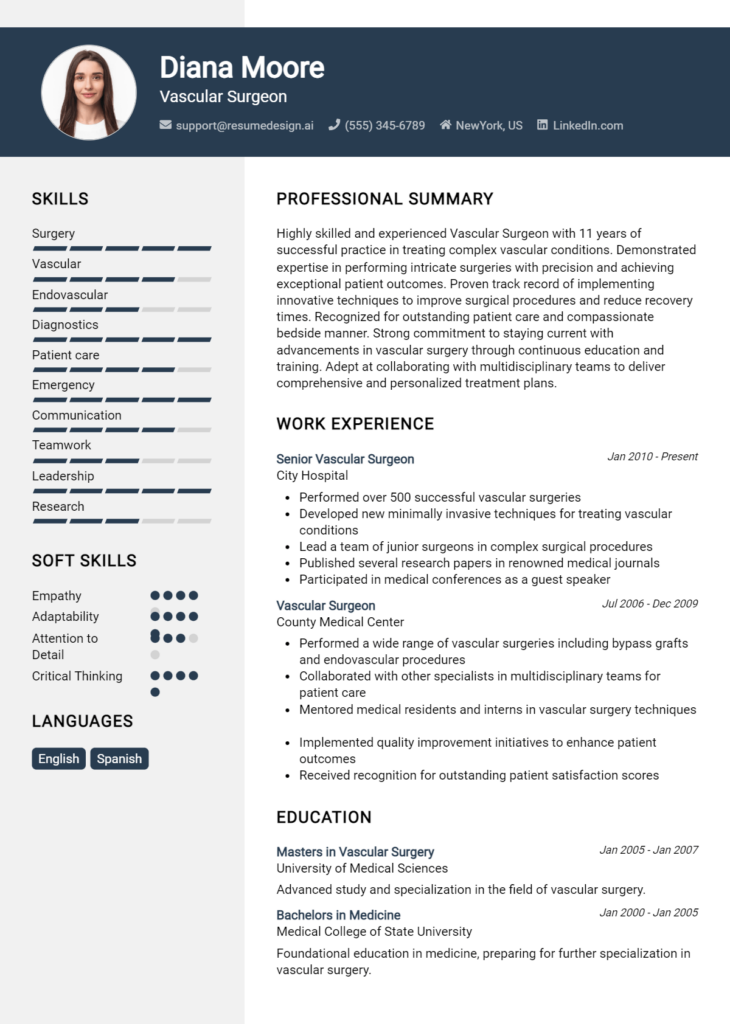Surgeon Core Responsibilities
Surgeons play a crucial role in healthcare, performing complex surgical procedures while collaborating with various departments such as anesthesia, nursing, and radiology. Their responsibilities include diagnosing conditions, devising surgical plans, and ensuring patient safety. Essential skills encompass technical expertise, operational efficiency, and advanced problem-solving abilities, all of which contribute to the organization's overarching goals of improving patient outcomes. A well-structured resume is vital in showcasing these qualifications, demonstrating the surgeon's capacity to excel in a collaborative environment.
Common Responsibilities Listed on Surgeon Resume
- Performing pre-operative assessments and evaluations
- Conducting surgical procedures with precision and care
- Collaborating with anesthesiologists and surgical teams
- Monitoring patient recovery and providing post-operative care
- Maintaining accurate medical records and documentation
- Educating patients and families about surgical procedures
- Staying updated on advancements in surgical techniques
- Participating in departmental meetings and case reviews
- Ensuring compliance with health and safety regulations
- Training and mentoring junior surgical staff
- Researching and implementing best practices in surgery
- Managing surgical instruments and equipment effectively
High-Level Resume Tips for Surgeon Professionals
In the competitive field of medicine, a well-crafted resume is crucial for Surgeon professionals aiming to make a strong first impression on potential employers. Your resume serves as your personal marketing tool, showcasing not only your skills and qualifications but also your unique achievements in the surgical arena. It needs to effectively reflect your experience, training, and dedication to patient care, as these elements can set you apart in a pool of highly qualified candidates. This guide will provide practical and actionable resume tips specifically tailored for Surgeon professionals, ensuring that your application stands out in the eyes of hiring committees.
Top Resume Tips for Surgeon Professionals
- Tailor your resume to the specific job description by highlighting relevant skills and experiences that align with the position.
- Showcase your clinical experience prominently, including the types of surgeries performed and your role in patient care.
- Quantify your achievements with specific metrics, such as the number of successful surgeries performed or improvements in patient recovery times.
- Highlight industry-specific skills, such as proficiency in advanced surgical techniques, knowledge of surgical instruments, and familiarity with the latest medical technologies.
- Include relevant certifications and training programs, emphasizing any specialized fellowships or continuing education that enhance your qualifications.
- Utilize action verbs to describe your responsibilities and accomplishments, making your resume more dynamic and impactful.
- Keep your resume concise and focused, ideally one to two pages, ensuring that every word adds value to your application.
- Incorporate a professional summary at the top of your resume that clearly outlines your key qualifications and career goals.
- Use a clean and professional format, making it easy for hiring managers to scan your resume quickly.
By implementing these tips, you can significantly increase your chances of landing a job in the Surgeon field. A polished and targeted resume will not only highlight your qualifications but also demonstrate your commitment to excellence in surgical practice, making a compelling case for why you are the ideal candidate for the position.
Why Resume Headlines & Titles are Important for Surgeon
In the competitive field of surgery, a well-crafted resume headline or title serves as a vital first impression for hiring managers. It is a succinct phrase that encapsulates a candidate's most relevant qualifications, skills, and experiences, instantly drawing attention amidst a sea of applications. A strong headline not only highlights your expertise but also sets the tone for the rest of your resume, making it essential to be concise, relevant, and tailored specifically to the surgical position for which you are applying. By presenting a clear and impactful summary of your professional identity, a compelling resume headline can significantly enhance your chances of landing an interview.
Best Practices for Crafting Resume Headlines for Surgeon
- Keep it concise: Aim for a headline that is brief yet informative.
- Be specific: Use terminology that reflects the particular surgical specialty you are pursuing.
- Highlight key qualifications: Focus on your strongest skills and experiences that align with the job.
- Use action words: Start with strong verbs to convey proactivity and expertise.
- Tailor for the role: Customize your headline for each application to reflect the specific requirements of the position.
- Avoid jargon: Use clear language that is easily understood, even by those outside your specialty.
- Showcase achievements: If applicable, include notable accomplishments that set you apart.
- Maintain professionalism: Ensure the tone is formal and aligns with the medical field’s standards.
Example Resume Headlines for Surgeon
Strong Resume Headlines
Board-Certified General Surgeon with 10+ Years of Experience in Minimally Invasive Techniques
Dedicated Cardiothoracic Surgeon Specializing in Complex Procedures and Patient Care Excellence
Experienced Pediatric Surgeon Committed to Advancing Surgical Techniques for Pediatric Patients
Trauma Surgeon with Proven Track Record in Emergency Surgical Interventions and Team Leadership
Weak Resume Headlines
Surgeon Looking for a Job
Experienced Medical Professional
Seeking Opportunities in Surgery
The strong resume headlines listed above effectively convey a clear and compelling message about the candidate’s qualifications, emphasizing their specific skills and experiences in the surgical field. They are impactful and tailored to the role, immediately informing hiring managers about the candidate’s expertise. In contrast, the weak headlines fail to impress due to their vagueness and lack of specificity, leaving hiring managers with little understanding of the candidate's unique qualifications or value proposition. A strong headline is a powerful tool that can make all the difference in capturing attention and securing interviews in a highly competitive environment.
Writing an Exceptional Surgeon Resume Summary
A resume summary is a critical component for a Surgeon’s job application as it serves as the first impression for hiring managers. A strong summary effectively captures attention by succinctly showcasing key skills, relevant experience, and notable accomplishments in the medical field. This concise yet impactful statement should be tailored specifically to the job being applied for, ensuring that it highlights the most pertinent qualifications that meet the employer’s needs. A well-crafted summary can set the tone for the rest of the resume and increase the likelihood of securing an interview.
Best Practices for Writing a Surgeon Resume Summary
- Quantify achievements: Use numbers to illustrate your success, such as surgeries performed or patient outcomes.
- Focus on key skills: Highlight technical and interpersonal skills relevant to the surgical field, like precision, communication, and decision-making.
- Tailor the summary for the job description: Adjust your summary to reflect the specific requirements and preferences outlined in the job posting.
- Use strong action verbs: Start sentences with impactful verbs to convey a sense of initiative and capability.
- Keep it concise: Aim for 2-4 sentences that deliver maximum impact without unnecessary detail.
- Highlight relevant certifications: Mention board certifications, fellowships, or other qualifications that set you apart.
- Showcase teamwork and collaboration: Emphasize your ability to work effectively within multidisciplinary teams.
- Include professional development: Briefly mention ongoing education or training that enhances your surgical skills.
Example Surgeon Resume Summaries
Strong Resume Summaries
Board-certified General Surgeon with over 10 years of experience in minimally invasive procedures, achieving a 95% patient satisfaction rate. Successfully performed over 1,500 surgeries with a focus on personalized patient care and collaboration with multidisciplinary teams.
Orthopedic Surgeon specializing in joint replacement surgeries, recognized for implementing innovative surgical techniques that reduced recovery time by 30%. Proven track record of improving patient outcomes through comprehensive pre-operative assessments and post-operative care plans.
Dedicated Cardiothoracic Surgeon with 12 years of experience in high-pressure environments. Led a surgical team that decreased post-operative complications by 20% through enhanced procedural protocols. Committed to continuous learning and excellence in patient care.
Weak Resume Summaries
Surgeon with many years of experience looking for a new opportunity. Skilled in various surgical procedures.
Dedicated medical professional interested in surgery. I have worked in hospitals and have a general understanding of the field.
The examples of strong resume summaries are considered effective because they provide specific details about the surgeon's experience, quantify achievements, and demonstrate direct relevance to the role. In contrast, the weak summaries lack specificity, actionable outcomes, and fail to convey the candidate's unique qualifications, making them less appealing to potential employers.
Work Experience Section for Surgeon Resume
The work experience section of a Surgeon resume is crucial as it provides a comprehensive overview of the candidate's professional journey, highlighting their technical skills and the ability to deliver high-quality patient care. This section effectively showcases the surgeon's capacity to manage teams, collaborate with other healthcare professionals, and implement best practices in surgical procedures. By quantifying achievements and aligning experiences with industry standards, candidates can illustrate their contributions to healthcare outcomes, making their resumes stand out in a competitive job market.
Best Practices for Surgeon Work Experience
- Focus on specific surgical procedures performed and their outcomes.
- Quantify achievements, such as reduction in surgery times or improved patient recovery rates.
- Highlight leadership roles in surgical teams or committees.
- Include collaboration with multidisciplinary teams to enhance patient care.
- Use action verbs to convey a sense of proactivity and initiative.
- Align experiences with current industry standards and guidelines.
- Showcase continuous education or training relevant to surgical practices.
- Detail innovative techniques or technologies adopted to improve surgical practices.
Example Work Experiences for Surgeon
Strong Experiences
- Performed over 300 laparoscopic procedures with a 95% success rate, leading to a 20% decrease in postoperative complications.
- Led a team of 10 surgical staff in implementing a new electronic health records system, enhancing patient data accessibility by 30%.
- Collaborated with a multidisciplinary team to establish a new patient care protocol, resulting in a 15% reduction in recovery time.
- Conducted training sessions for 15 junior surgeons on advanced surgical techniques, improving overall team performance and patient outcomes.
Weak Experiences
- Assisted in surgeries and worked with surgical teams.
- Participated in various medical conferences and workshops.
- Worked in a hospital setting for several years.
- Performed surgeries as needed without specific details on outcomes.
The examples listed as strong demonstrate clear, quantifiable achievements that reflect the candidate's technical expertise and leadership abilities in the surgical field. These experiences provide concrete evidence of their contributions to patient care and team dynamics. In contrast, the weak experiences lack specificity and measurable outcomes, making them less impactful and failing to showcase the candidate's true capabilities or achievements in a way that resonates with hiring managers.
Education and Certifications Section for Surgeon Resume
The education and certifications section of a Surgeon resume is crucial in showcasing a candidate's academic qualifications and professional competence. This section serves as a testament to the rigorous training and specialized knowledge required in the medical field, highlighting not only degrees obtained but also any industry-recognized certifications. Continuous learning is vital in surgery, given the rapid advancements in medical technology and techniques, and this section allows candidates to demonstrate their commitment to staying current. By detailing relevant coursework, certifications, and specialized training, candidates can enhance their credibility and align themselves with the specific requirements of the job, making a compelling case for their candidacy.
Best Practices for Surgeon Education and Certifications
- List degrees in reverse chronological order, starting with the most recent.
- Include the name of the institution and graduation dates for all degrees.
- Highlight any board certifications relevant to the surgical specialty.
- Incorporate any fellowship training or specialized surgical programs completed.
- Provide details of relevant coursework that pertain directly to surgical practices.
- Include continuing education credits or workshops attended related to surgical advancements.
- Ensure that all certifications listed are current and applicable to the role.
- Tailor the section to match the job description, emphasizing the most relevant qualifications.
Example Education and Certifications for Surgeon
Strong Examples
- Doctor of Medicine (MD), Harvard Medical School, Graduated May 2020
- Board Certified in General Surgery, American Board of Surgery, Certified 2021
- Fellowship in Cardiothoracic Surgery, Mayo Clinic, Completed June 2022
- Advanced Trauma Life Support (ATLS) Certification, American College of Surgeons, Current until 2024
Weak Examples
- Bachelor of Science in Biology, University of Anytown, Graduated 2015 (not directly related)
- Certification in Basic Life Support (BLS), Expired 2020
- Online Course in Nutrition, 2021 (not relevant to surgery)
- High School Diploma, Anytown High School, Graduated 2011 (not needed)
The strong examples listed are considered effective because they directly relate to the qualifications and competencies required for a Surgeon, showcasing advanced education, specialty training, and current certifications that are relevant to the role. In contrast, the weak examples fail to contribute meaningful value; they include outdated or unrelated qualifications that do not demonstrate the candidate's preparedness for a surgical career. Including strong examples helps paint a picture of a qualified and dedicated professional, whereas weak examples can detract from the applicant's overall credibility.
Top Skills & Keywords for Surgeon Resume
As a surgeon, possessing a well-rounded set of skills is crucial for success in the operating room and beyond. A well-crafted resume should highlight both hard and soft skills, showcasing your technical proficiency as well as your ability to work collaboratively in high-pressure situations. Employers look for surgeons who not only have the necessary medical knowledge and expertise but also the interpersonal skills to interact effectively with patients and medical staff. By emphasizing these skills in your resume, you can present yourself as a qualified candidate ready to meet the demands of the profession. For more insights on how to effectively showcase your abilities, check out our resources on skills and work experience.
Top Hard & Soft Skills for Surgeon
Soft Skills
- Communication
- Empathy
- Teamwork
- Problem-solving
- Adaptability
- Attention to Detail
- Stress Management
- Leadership
- Critical Thinking
- Time Management
- Active Listening
- Patience
- Decision Making
- Conflict Resolution
- Interpersonal Skills
- Compassion
- Resilience
Hard Skills
- Surgical Techniques
- Anesthesia Administration
- Patient Assessment
- Knowledge of Medical Instruments
- Diagnostic Skills
- Emergency Response
- Surgical Planning
- Knowledge of Postoperative Care
- Research and Data Analysis
- Familiarity with Medical Software
- Clinical Documentation
- Infection Control Procedures
- Radiological Interpretation
- Understanding of Anatomy and Physiology
- Regulatory Compliance
- Multidisciplinary Collaboration
- Continuing Medical Education
Stand Out with a Winning Surgeon Cover Letter
I am writing to express my interest in the Surgeon position at [Hospital/Clinic Name], as advertised on [Job Board/Website]. With a robust background in surgical procedures, patient care, and a commitment to advancing medical practices, I am excited about the opportunity to contribute to your esteemed team. My extensive training in [specific surgical specialty, e.g., general surgery, orthopedic surgery] and my dedication to providing exceptional care align perfectly with the values of [Hospital/Clinic Name].
Throughout my [number] years of experience in the surgical field, I have honed my skills in performing complex procedures while maintaining a patient-centered approach. I completed my residency at [Residency Program/Hospital Name], where I had the privilege of working alongside renowned surgeons and developing proficiency in the latest surgical techniques. My commitment to continual learning and improvement has driven me to stay updated with advancements in surgical technology and methodologies, enabling me to provide the highest standard of care to my patients.
At [Previous Hospital/Clinic Name], I led a team in implementing a new surgical protocol that reduced patient recovery times by [specific percentage or number], showcasing my ability to enhance operational efficiency and patient outcomes. My collaborative approach and strong communication skills have allowed me to work effectively with multidisciplinary teams, ensuring comprehensive care for every patient. I am passionate about mentoring the next generation of surgeons and have actively participated in training medical students and residents during my tenure.
I am eager to bring my expertise and enthusiasm for surgical excellence to [Hospital/Clinic Name]. I would be thrilled to discuss how my background, skills, and certifications align with your needs. Thank you for considering my application. I look forward to the opportunity to contribute to your team and provide exceptional care to the patients we serve.
Common Mistakes to Avoid in a Surgeon Resume
Crafting a compelling resume is crucial for surgeons seeking to advance in their careers. Even seasoned professionals can make mistakes that hinder their chances of landing interviews or securing positions. Understanding common pitfalls can help candidates present their skills and experiences more effectively. Here are some frequent mistakes to avoid when creating a surgeon resume:
Generic Objective Statement: Using a vague or generic objective fails to capture the attention of hiring committees. Tailor your objective to reflect your specific goals and how they align with the institution’s mission.
Overloading with Medical Jargon: While it’s important to showcase your expertise, excessive medical terminology can alienate non-medical reviewers. Aim for clarity and balance.
Neglecting Soft Skills: Focusing solely on technical skills overlooks essential soft skills like communication, teamwork, and empathy, which are vital in a surgical environment. Highlight these attributes in your resume.
Ignoring Achievements: Simply listing job duties without emphasizing accomplishments can make your resume blend in with others. Use quantifiable achievements to illustrate your impact, such as reduced patient recovery times or improved surgical outcomes.
Inconsistent Formatting: A cluttered or inconsistent layout can make your resume difficult to read. Maintain uniform font sizes, bullet points, and spacing to enhance readability and professionalism.
Omitting Continuing Education: With the ever-evolving nature of medicine, neglecting to include recent certifications, workshops, or training can signal complacency. Make sure to list relevant continuing education efforts.
Using Passive Language: Phrasing your experiences in passive voice can diminish the strength of your statements. Use active voice to convey your contributions assertively.
Exceeding Length Recommendations: A common mistake is creating an overly lengthy resume. Aim for a concise format, ideally one to two pages, focusing on the most relevant information to keep the reader engaged.
Conclusion
In this article, we have explored the vital role of a surgeon, highlighting the skills, qualifications, and experiences that define this demanding profession. Surgeons are not just skilled operators; they are also critical thinkers, effective communicators, and compassionate caregivers. We discussed the importance of specialized training, continuous education, and the ability to work under pressure, all of which contribute to a surgeon's effectiveness and success in the operating room.
As you reflect on your journey and achievements as a surgeon, it's essential to ensure that your resume accurately reflects your skills and experiences. A well-crafted resume can make a significant difference in your job search, showcasing your qualifications to potential employers.
To assist you in this process, we encourage you to utilize available resources that can help elevate your application materials. Consider exploring resume templates that are designed specifically for healthcare professionals. Additionally, the resume builder can streamline the creation of a polished and professional resume tailored to your unique experience. For inspiration, check out resume examples that highlight successful surgeon profiles. Don’t forget to complement your resume with a compelling cover letter template that conveys your passion for the field and your commitment to patient care.
Take action now to review and refine your surgeon resume, ensuring that it effectively represents your skills and accomplishments. Your next opportunity awaits!

